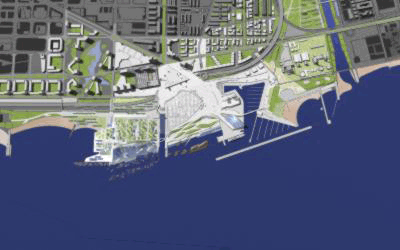The disarticulated forms of neoliberal urbanism in the XXI century: the case of Barcelona Forum 2004
DOI:
https://doi.org/10.6092/2281-4574/1261Keywords:
urban regeneration policies, public spaces, participationAbstract
The contradictions within the policies of requalification of the City of Barcelona have become more evident in relation to some of the most recent urban transformations, as in the case of the project for the renewal of the Diagonal-Mar area; urban space where the Forum of Cultures 2004 has been held. The Forum turned into a failure, according to the paradigm of the criticisms, on the cultural and, above all, political (or marketing) level; in its urban dimension, it has been the expression of the city that mires to the global insertion: it is a urban planning which is prevalently oriented to the external demand. The regeneration of the Diagonal-Mar has shown a scant consideration of social objectives, with the creation of spaces, where the concept of value of exchange predominates over the value of use. The actor (public and above all private investors), that participated to the redaction of the project of urban renewal of the area, produced a great propagandistic effort, presenting it as an open cultural initiative which can assume also the social criticisms.
A lot of social and civil organization did not participate, and their proposals have not been accepted, and so, today, urban and social processes, rebound on the success or failure of the urban planning in an important area of the city. From that, what Borja (2005) defines the “urban malaise of Barcelona” starts, over the years of social and economic growth, the inhabitants of Barcelona fell a certain malaise, which is highlighted by the today’s crisis. The big urban projects do not generate any enthusiasm, citizens feel themselves progressively less owners of the own city, the architecture of the “great singular objects” does not represent the element of identity of the society. By scanning those urban imaginaries from a theoretical-conceptual viewpoint, which is formal and empiric, the question emerges, if the punctual urban planning operation of a sector could create evaluations, mechanisms of actuation and directions which allow to make right decisions, by avoiding the spatial and social desertification of a public space. This is an example of what could happen when the global capital is not adequately regulated at the social level.
Downloads

Downloads
Additional Files
Published
Issue
Section
License
Gli autori che pubblicano su questa rivista accettano le seguenti condizioni:- Gli autori mantengono i diritti sulla loro opera e cedono alla rivista il diritto di prima pubblicazione dell'opera, contemporaneamente licenziata sotto una Licenza Creative Commons - Attribuzione che permette ad altri di condividere l'opera indicando la paternità intellettuale e la prima pubblicazione su questa rivista.
- Gli autori possono aderire ad altri accordi di licenza non esclusiva per la distribuzione della versione dell'opera pubblicata (es. depositarla in un archivio istituzionale o pubblicarla in una monografia), a patto di indicare che la prima pubblicazione è avvenuta su questa rivista.
- Gli autori possono diffondere la loro opera online (es. in repository istituzionali o nel loro sito web) prima e durante il processo di submission, poiché può portare a scambi produttivi e aumentare le citazioni dell'opera pubblicata (Vedi The Effect of Open Access).

